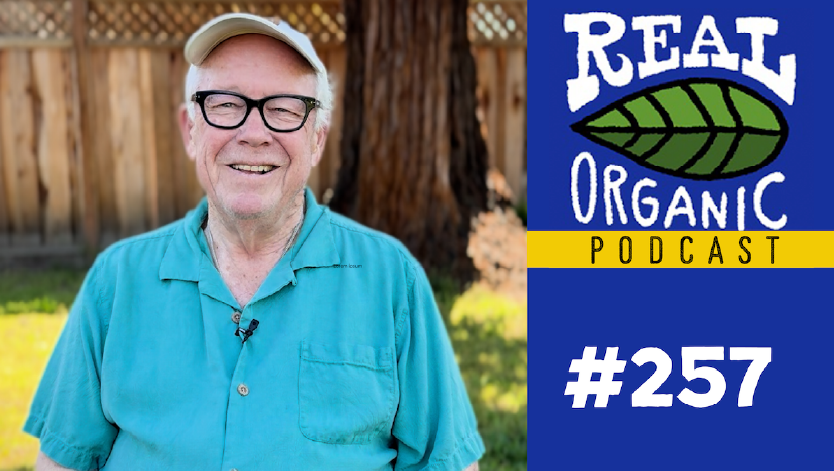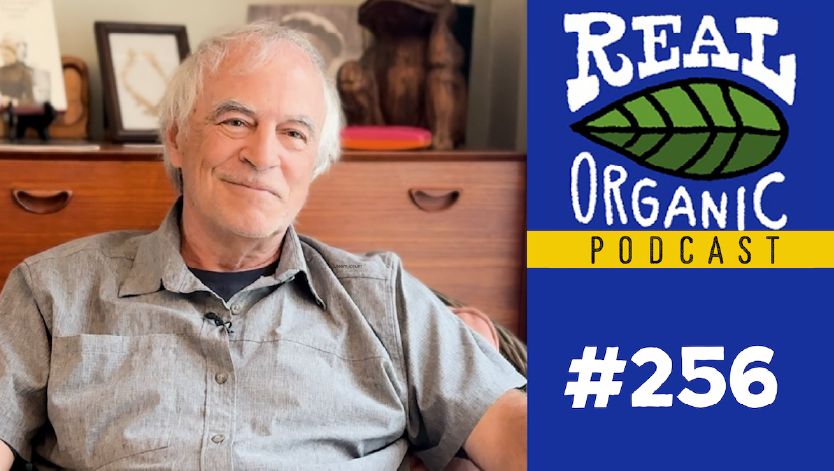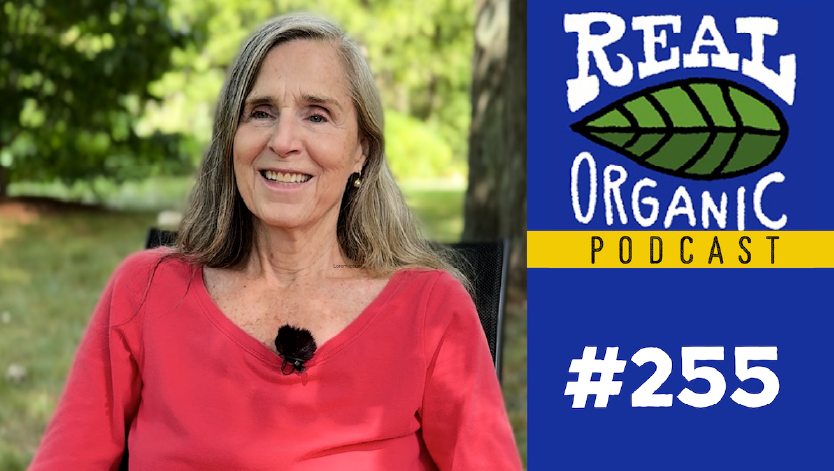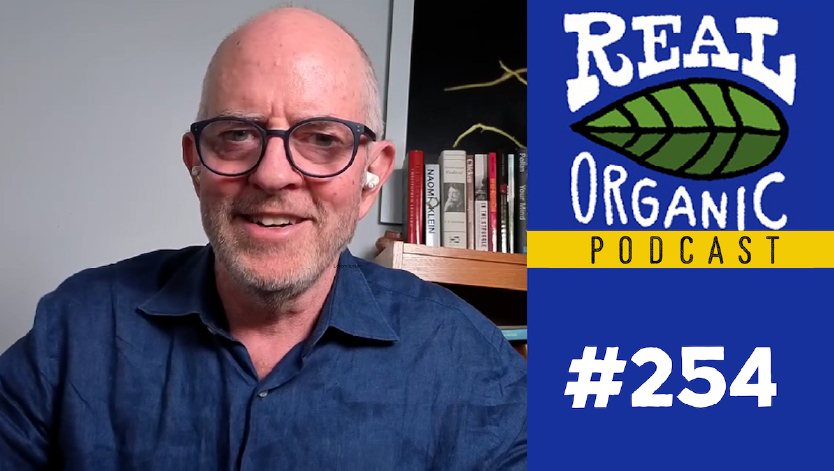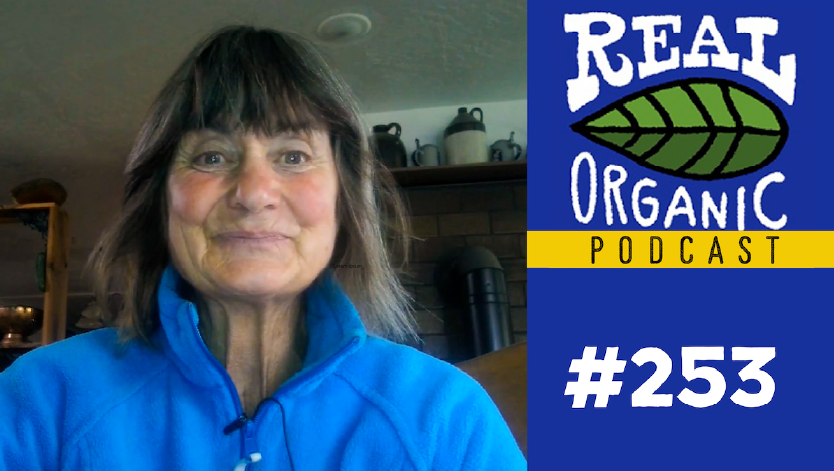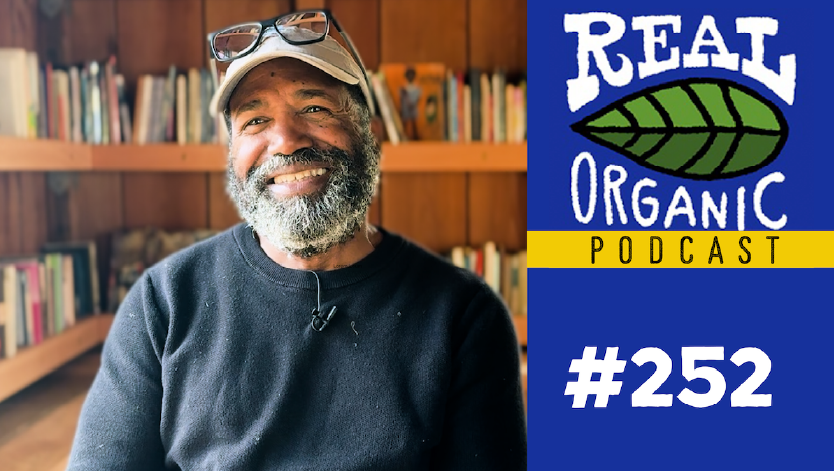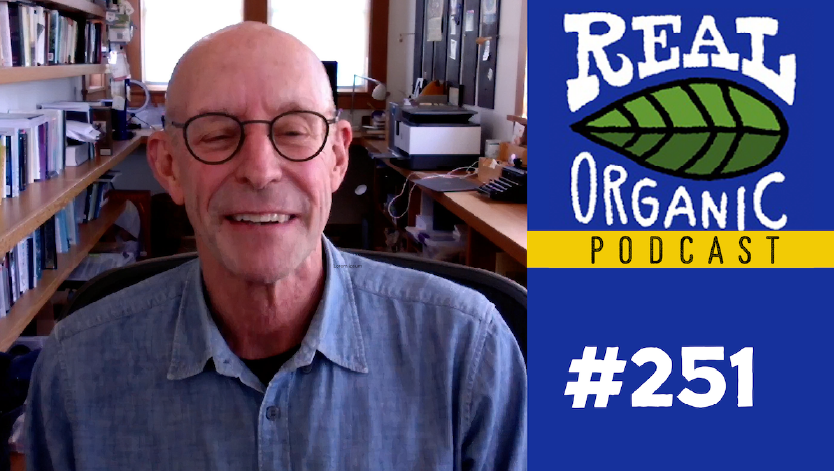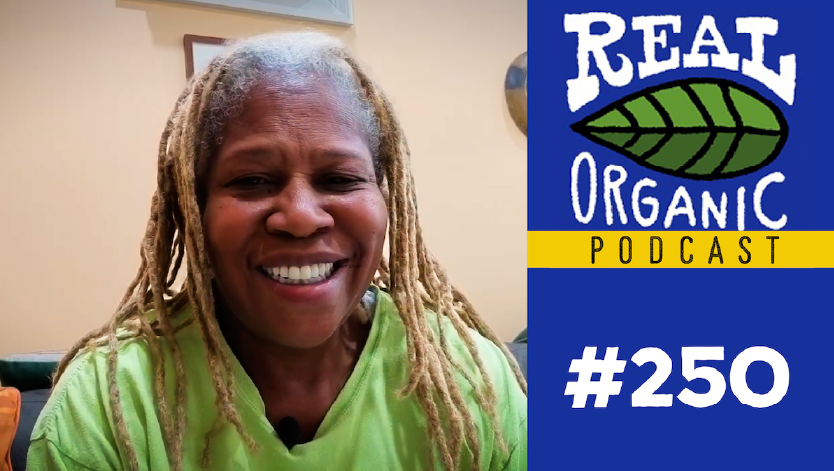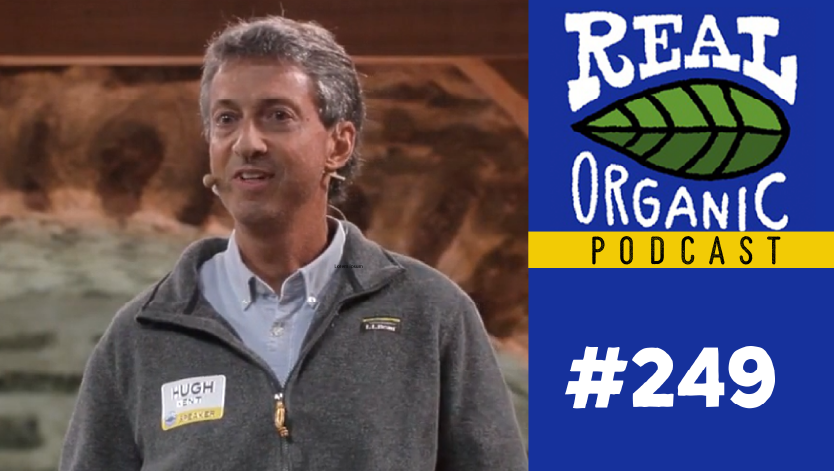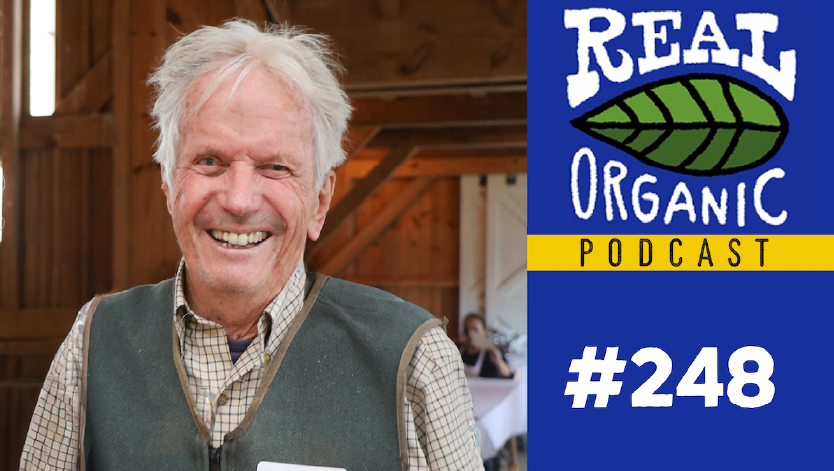Episode #246
Emily Oakley: A Standalone Label for Real Organic Project
At the Saving Real Organic conference at Churchtown Dairy, Emily Oakley – vegetable grower, founding Real Organic Project board member, and long-time advocate for small farms – delivered a powerful call for the future of organic certification. Speaking from her experience as a two-acre CSA farmer in Oklahoma and a former member of the National Organic Standards Board, Emily examines why small farms are leaving USDA Organic and what it would mean for Real Organic Project to create its own standalone label. Her talk is both a critique and a vision – one rooted in integrity, fairness, and the belief that organic should once again belong to farmers, not corporations.
Our Emily Oakley talk was recorded live on stage at the Saving Real Organic Conference at Churchtown Dairy on September 27, 2025:
You can subscribe and download episodes of our show through your favorite podcast app, our YouTube channel, or stream the audio-only version here:
Emily Oakley live on stage at Churchtown Dairy, September 27, 2025: Stay Small And Stay In
Linley Dixon 0:00
Our next speaker is Emily Oakley from Three Springs Farm in Oklahoma. She was our presenter at Farmer Friday yesterday. I didn’t have the privilege of getting to know Joan as much as everybody else did, so my mantra is always, “What would Emily do?”
Linley Dixon 0:15
She was on the NOSB (National Organic Standards Board) when I first met her. She fought very hard there, speaking truth to power. Then she was a founding Real Organic Project board member for our organization. So, without further ado, Emily Oakley.
Emily Oakley 0:39
Thank you, Linley. You’re way too kind. But like Joan, I don’t plan on holding back this afternoon. Good afternoon, everyone. After lunch, I know it’s a little bit tricky at this time.
Emily Oakley 0:51
I’m going to be talking about the small farmers that are either avoiding or dropping USDA certification, and what that means for organic and the Real Organic Project, because it raises questions of farmer identity, ease of certification, customer requirements, and organic as a marketing tool versus a movement.
Emily Oakley 1:13
More importantly, it brings to the fore how ROP can serve small farmers, what happens when those small farmers drop certification or never get it at all, and whether there’s room for a new label for them.
Emily Oakley 1:27
Like many Real Organic Project farmers, my partner and I are first-generation farmers who came to agriculture out of a deeply rooted passion for the environment and social justice. As with most small-scale growers, we didn’t choose this profession because we thought we would get rich. We were drawn into farming for the opportunity to live our values, and we’re lucky enough to do that thanks to our community of eaters.
Emily Oakley 1:54
We raise a diversity of vegetables on about two acres of land, with the same amount in a fallow period cover crop. Mainly through our 300-member CSA, we’re a two-person operation, and farming is our full-time job.
Emily Oakley 2:09
The mantra actively pursued by the USDA in the 1970s under then Secretary of Agriculture Earl Butz, “Get big or get out,” has a counter-narrative: “Stay small and stay in.” While we are under no illusion that all farming can be small scale, we strongly believe that the country needs more small-scale farms serving their local and regional communities.
Emily Oakley 2:36
The push in farming and many business models is continuous growth – bigger farms, bigger businesses, more, more, more. If you’re not growing, you’re not thriving. But it doesn’t have to be that way. We’ve tried to resist that notion by being as small as possible while still making a living and saving for retirement.
Emily Oakley 3:03
We don’t achieve this through outrageous prices, but through honing in on profitable crop mixes, looking for efficiency, and achieving a retail price by selling directly to our customers or eaters. How incredible would it be if our nation was filled with thousands more small farms?
Emily Oakley 3:22
Rather than existing farms getting bigger over time to meet the increasing demand for organic food, what if more people got into organic farming and stayed small? Farming is a viable career, and in the 22 years that we’ve been at it, we’ve seen more young people exploring and embracing community-based agriculture for their livelihoods.
Emily Oakley 3:44
The Real Organic Project helps tell the stories of small-scale farms across the country that are feeding their communities. These farm successes push back hard against the “We need big farms to feed the world” mantra that is so often tossed around.
Emily Oakley 4:02
This is evidenced by the USDA 2022 Census, which shows that the number of direct-to-consumer or local farms more than doubled to 60,000 over the previous five years. That’s approximately 5,600 people for every local farm. It doesn’t take a suspension of disbelief to see the incredible potential here.
Emily Oakley 4:26
Part of enticing and keeping new organic farmers is a movement that they can feel connected to and a part of. The back-to-the-land ethics of the 1960s and 1970s, coupled with the drive to farm in a way that protected the environment, gave birth to the modern organic movement – and those values still resonate with new farmers.
Emily Oakley 4:49
The success of organics eventually led to the federal legislation in 1990 that created the USDA Organic Standards. Unfortunately, over time, some new farmers are opting out of organic certification. Why is that? Equally troubling, small farms that were once USDA-certified are dropping their certification. Why is that?
Emily Oakley 5:13
The reasons are many: cost, paperwork burdens, and difficulty finding a certifier. But I believe the heart of the matter lies in skepticism about the integrity of the USDA seal, based largely on lobbying pressure from businesses with an extensive market share and an outsized influence on organic standards.
Emily Oakley 5:36
Farmers advocated for the USDA seal expecting that the government would uphold and enhance the meaning of the word “organic,” not undermine it. This is where the Real Organic Project offers an organization and a label that farmers can join to feel part of something that is more than a marketing tool – something that conveys why they farm the way they do.
Emily Oakley 5:59
It provides them with an add-on label that distinguishes their farms as committed to soil health and animal welfare. It connects them with other growers who feel the same. That’s why ROP took off running from the beginning, garnering broad support across the country.
Emily Oakley 6:15
We want to encourage more small farmers to get into farming, to keep farming, to farm organically, to stay small while farming, and to feel as though they are part of a meaningful movement. When we started farming on our own in 2004, seeking organic certification was an essential part of our agricultural identity.
Emily Oakley 6:37
It felt like a connection to the founding farmers of the organic movement who helped build the principles and practices behind that system. That’s no longer the case with many beginning farmers or even established direct-to-consumer growers who never certify or drop certification.
Emily Oakley 6:56
Since its founding in 2017, the Real Organic Project has been an add-on label in which farmers must first be USDA-certified organic before they can join ROP. There are a number of reasons for creating it as an add-on, including the desire to continue supporting the label that farmers created and the ease of using USDA standards as a baseline.
Emily Oakley 7:21
ROP certification then layers on increasing commitments from the farmers to grow according to additional standards. By serving as an add-on label, ROP relies on the farm’s USDA certification process to verify that those standards are being met. The ROP team then carries out on-farm inspections every five years to enforce the add-on standards.
Emily Oakley 7:46
Over the past several years, ROP has seen a trend. While the organization gains over a hundred new farms each year, roughly a similar number are dropping ROP certification because they are dropping USDA certification too. That is an incredibly meaningful fact. Small farms are quitting the USDA in significant numbers each year.
Emily Oakley 8:11
Wouldn’t it be amazing if ROP could be a home for the small farms slipping through the big organic net? Why aren’t some local farmers staying certified? What can we do to address this? How do we keep them from leaving?
Emily Oakley 8:26
I believe the answer lies in how one answers the following question: Is organic a label, a marketing scheme, an industry, or a movement? How you answer that depends on your organic identity politics. Why does a farmer choose to be organic? Are they certified because they’re looking for a higher price point or trying to tap into consumer demand? How much do they believe in the ethics behind organic?
Emily Oakley 8:58
Farmers obviously need the USDA seal to sell wholesale and to retail stores, but direct-to-consumer growers don’t have to have certification to interface with their end users. That is why many can afford to opt out of certification in the first place or to drop it if they decide it has become too onerous or no longer reflective of their values. Yet, they still want to communicate to their community that they’re organic.
Emily Oakley 9:25
While the USDA has the budget and infrastructure to run a nationwide certification program, they don’t have arm’s-length distance from corporate lobbying or political pressure and influence. Even when they do have the budget, they are not immune to the vagaries of different administrations and their varying agendas.
Emily Oakley 9:47
For example, this year the National Organic Program staff was cut by close to one-third, even at a time when enforcement and fraud prevention are so needed. Although people have married opinions about that, one thing is certain, and that is that politics do impact USDA Organic certification.
Emily Oakley 10:08
There are dedicated consumer and farmer stakeholders advocating tirelessly at the NOP level for transparency, enforcement, accountability, and integrity, but no organization has a budget that even remotely rivals that of big businesses, their lobbyists, and trade organizations. Although consumer and farmer groups have grassroots representation on their side, that can only go so far in combating corporate pressure, and it’s exhausting in the process.
Emily Oakley 10:39
Keeping strong organic standards shouldn’t be that hard. It’s not idealistic to believe that USDA Organics should be above corporate and political pressure. It’s actually pragmatic to believe that if we accept lobbying as a normal part of doing business, we will always be playing catch-up with the standards.
Emily Oakley 11:01
So, can the Real Organic Project offer more than an add-on label? Could there be room in the movement for another standalone organic seal – one that uses the USDA standards as its ground floor and then augments farmers’ commitments toward practices for things like biological diversity, habitat creation, animal welfare, and farmworker protections – and that does not require USDA certification first?
Emily Oakley 11:32
It’s those additional values that inspired so many small farms to join ROP in the first place. How do we keep them from leaving the ROP label, if not the USDA label? Imagine how impactful this movement could be if we brought together all the uncertified farmers who meet the Real Organic standards.
Emily Oakley 11:52
How do we include small farms that have left the USDA or never joined it and still honor the word “organic”? How can we make the biggest impact for them, and what’s needed to create a standalone label – one with the rigor of verification and enforcement?
Emily Oakley 12:10
Last year, the NOP at the USDA had an annual budget of 24 million dollars. For the Real Organic Project, it would mean a budget and the organizational infrastructure to conduct annual inspections for their growers. It would mean monitoring the USDA standards to make sure ROP growers continue to follow them.
Emily Oakley 12:30
It would mean collaborating with the many organic advocates and stakeholders – many of whom are here – who work to uphold the USDA to its promises in order to build unity around a new label.
Emily Oakley 12:41
If ROP were a standalone label, the number of certified farms could grow to 10,000 quickly. To keep certification free for small farms, which it should be, because the burden of certification should never fall on the organic farmer, ROP would need a secured annual budget of 10 million dollars. While this may seem like a lot, it’s actually quite small compared to the impact this could have on uniting the organic movement.
Emily Oakley 13:13
Would a new standalone label use the word “organic”? I’d say it’s not a mistake to create a standalone label with the word “organic” as long as the ROP standards use the NOP as their baseline. Technically, while not USDA-certified, those farms would be following the same standards and getting inspected and verified, so using the word “organic” would be harder to argue against. Moreover, ROP ups the game by adding its own higher standards.
Emily Oakley 13:44
If the USDA standards were never intended as a ceiling, a new label is a chance to augment organic practices for continuous improvement without having to fight so hard to maintain them. To give you an example of what I’m talking about, during my term on the National Organic Standards Board, we voted on a recommendation to prevent growers from converting native ecosystems immediately into organic production.
Emily Oakley 14:12
Why would a farmer want to do that if they don’t care about the environment and are only looking for a quick way to get immediate certification? Those native ecosystems haven’t had prohibited substances applied to them, like herbicides and pesticides, so they can be taken out of wild land and immediately put into organic agricultural production without having to go through the three-year transition period.
Emily Oakley 14:36
You would think a recommendation to prevent this would be a no-brainer, something all organic stakeholders and the USDA could get behind – but not so. Not only did it take an inordinate amount of effort and compromise to get a recommendation passed, but the USDA has made it clear that they have no intention of putting that recommendation through rulemaking. It’s gathering proverbial dust on the shelf, and it’s insults like this that feed skepticism of the USDA seal.
Emily Oakley 15:07
Whether a new standalone label were to use the word “organic” isn’t the heart of the question as I see it. The question is, how do we reach and represent the thousands of small farmers growing organically who don’t currently have a label? The Real Organic Project could be that home. The opportunity to reach growers and their customers – people who are already primed to farm and eat according to Real Organic Project standards – is already there.
Emily Oakley 15:39
They’re just looking for a voice and for a movement that captures their reason for farming. Including more eligible farmers isn’t just about altruism. Many farmers make organic claims to their consumers without being certified. I believe in certification as a way of ensuring that that’s true for both the consumer and other farmers.
Emily Oakley 16:02
I don’t want the word “organic” to lose its meaning. Creating a certification that welcomes these growers under the word “organic” actually protects the label and the word. I think of the producers who compete against other growers in farmers’ markets who use the word “organic” without verification.
Emily Oakley 16:22
I think of the customer who wants to believe it. I think of the grower who is in a region of the country without good USDA certification options, who has to say things like, “We grow using organic methods,” but who doesn’t feel like they can be a part of the movement.
Emily Oakley 16:39
I think of the USDA paperwork that only gets more complicated in their efforts to prevent large-scale fraud, but in the case of small growers, that just adds another burden without meaningfully affecting fraud. Farmers will always seek a means of explaining themselves to their customers using a variety of terms like “natural,” “sustainable,” and the latest iteration, “regenerative.”
Emily Oakley 17:05
But each of those words is also being used by large-scale agricultural interests that have little in common with them. These terms are subject to interpretation and misuse. Organic integrity is as much about trust as it is about enforcement. Here’s the thing: right now, many of us are sharing the USDA label with producers we don’t trust, whose practices we reject.
Emily Oakley 17:32
As someone who’s one of those growers who doesn’t need the USDA seal to survive, that’s not a good feeling. I don’t want to undermine or devalue the USDA label for all of those farmers who need it and want it. I’m trying to find a way to include farmers in every state, at every farmers market, at every farm conference I attend, who identify as organic but don’t carry the seal.
Emily Oakley 17:59
Frankly, I didn’t become certified organic to share the label with CAFO chicken or watery hydroponic lettuce. Nor do I enjoy sharing the label with “organic” Doritos, “organic” Gatorade, and, as Joan infamously noted, the “organic” Twinkie.
Emily Oakley 18:16
Just think of the tremendous freedom of belonging to a label in which we don’t have to have those fights – the time we could instead dedicate to celebrating the awesome stories and successes, helping farmers relate their innovations. The focus becomes what we stand for, not what we’re fighting against.
Emily Oakley 18:36
I believe that I see what is both a problem and an opportunity, because 25% of the Real Organic Project’s farm applicants each year are non-NOP-certified organic farmers, and this is in spite of the fact that the communications from ROP clearly state that it’s an add-on to USDA certification. But they apply anyway.
Emily Oakley 18:59
I think that message is really clear. There is a problem if we miss out on these growers, their voices, and their passion. They may not need a label to survive and thrive, but many of them want one and simply don’t see a viable option. The organic label shouldn’t just be for bigger farms or wholesaling. A label is more than a label – it should be a link straight from the farmer directly to their eaters that communicates their farm’s purpose.
Emily Oakley 19:29
Organic certification that’s also a movement creates a sense of identity, belonging, and community. It gives farmers a place to turn for links to other like-minded growers – a network for mentoring and farmer-to-farmer skill sharing. Movements sustain us through hard times and unite us to a common cause.
Emily Oakley 19:50
If we’re talking about antitrust, we’re talking about making certification reachable for all farmers – not by watering down standards, but by actually strengthening them through giving growers access to certification. So, we have an opportunity to include those farmers who make valiant efforts to grow organically, who farm with integrity and for integrity, and who are often the face of their local farming communities, and who deserve a label that understands and rewards that.
Emily Oakley 20:21
There’s a whole community of uncertified organic farmers out there who don’t have a home. Can the Real Organic Project be that philosophical home, that movement to which they belong? I believe it can – with the support of the eaters who care – because the Real Organic Project has an abundance of something lacking at the USDA: integrity and trust. I believe the time for a Real Organic Project standalone label is now.


